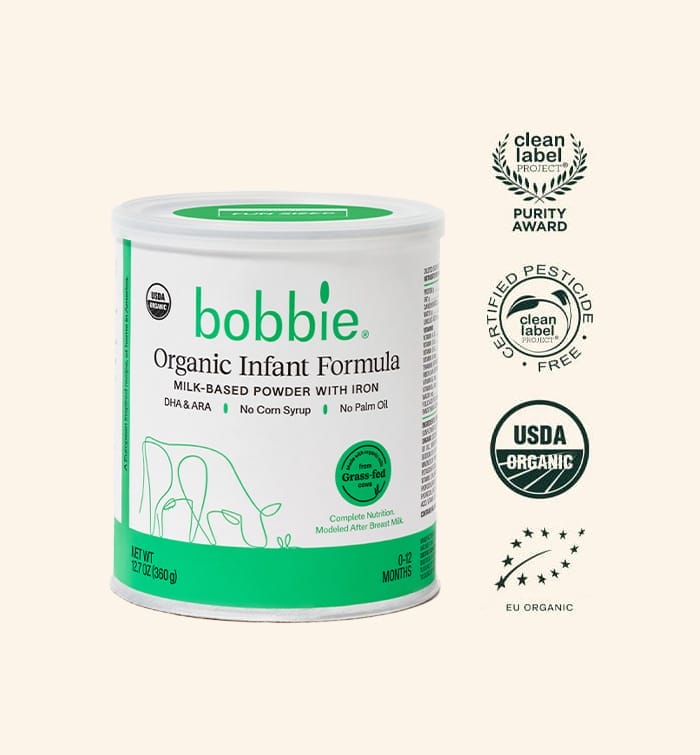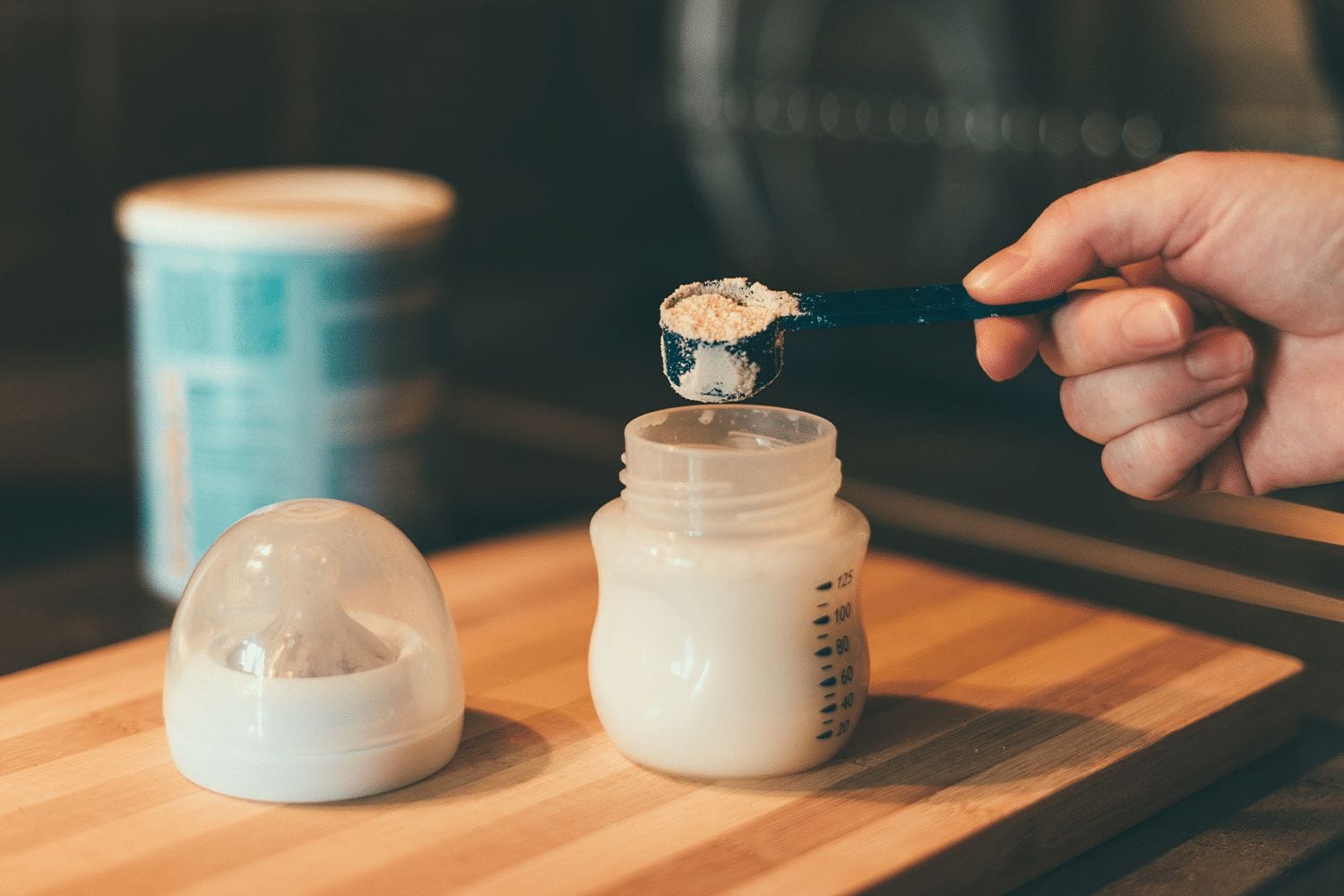We are proud to say that these posts are not sponsored. Our editorial team of Bobbie moms and writers personally select each featured product. If you buy something through our links, we may earn an affiliate commission, at no cost to you.
Landing on this article means one of two things: you measured your baby’s formula wrong and are scared this may be harmful to them (if you’ve already given them the formula), or you are wondering whether you have to throw it out if they haven’t taken the bottle yet.
First things first— it happens. Parents of newborns are not the most well-rested, after all.
There are basically two ways to make baby formula incorrectly:
- Mixing the formula powder with too much water, making a diluted formula mixture.
- Mixing the formula powder with too little water, making an over-concentrated formula mixture.
No matter how the baby formula is incorrectly mixed, this can be harmful for your baby. So if you haven’t already given them the wrongly-mixed formula, it’s best to just throw it out and make another bottle.
Whether you’ve mixed the formula wrong once or many times, don’t panic, and don’t beat yourself up. It happens, which is why we’re dedicating an entire article to the subject. Maybe you misread the directions, lost track of time, were interrupted by your other children, all the mom things that happen… Don’t feel guilty- you’re still a great parent, and it’s completely normal to make this mistake.
Infant Formula Regulation in the US
“Infant formula is one of the most regulated food items in the US, and with good reason: nutrition is crucial during a young infant’s life, and they need precise amounts of macro and micronutrients in order to grow and develop normally,” states Jacqueline Winkelmann, MD, board-certified pediatrician and child advocate. “The FDA sets minimum and maximum amounts1 of many of the ingredients in infant formula, and this is why it is so important that formula is mixed properly.”
Dr. Winkelmann says the biggest risk of feeding your baby incorrectly mixed formula is that they could develop problems with the balance of salt and other electrolytes in their body, which can be dangerous. While a one-time mistake isn’t likely to cause any major problems, feeding incorrectly mixed formula to your baby for a few days or weeks can cause some serious issues.
How incorrectly mixed baby formula can cause problems:
Over-Concentrated Formula (Mixing Too Much Formula/Too Little Water)
You spaced out and just kept scooping. Again, it happens. If it happens once, you probably won’t notice much of a change with your baby’s routine. If it happens many times, problems can occur.
Repeatedly over-mixing formula2 over time can have serious side effects like:
- Dehydration. Signs of dehydration can be excessive sleepiness, fewer wet diapers, dark urine, dry mouth, lack of tears (after the first few weeks of life) and/or a sunken spot on the head. If your baby has any of these signs, they need to be evaluated by a healthcare provider right away.
- Salt and water imbalance
- Seizures and brain damage
- Kidney issues
“Mistakes happen! You are not a bad parent!” says Dr. Winkelmann, “Keep a close eye and look for any changes in behavior or hydration status. If you know your baby has been fed over-concentrated formula several times, it’s best to discuss with your healthcare provider.”

Shop Bobbie Organic Infant Formula
Bobbie Organic Infant Formula is a USDA Organic, EU-style infant formula that meets all FDA requirements. It is a complete nutrition milk-based powder modeled after breast milk and is easy on tummies. It is non-GMO and doesn't have corn syrup, palm oil, or maltodextrin. Learn more about Bobbie.
Diluted Formula (Mixing Too Little Formula/Too Much Water)
Did you put in one scoop or two? By the time you realize you mixed your baby’s formula wrong, they’ve already taken the bottle. Don’t panic. One diluted bottle isn’t likely to cause a major problem, but over time diluted formula3 can lead to serious health issues for your baby.
Some parents may dilute their baby’s formula on purpose to stretch it out and make it last longer. This is dangerous and should not be done. The government’s WIC program4 and many other local and state programs can help, so be sure to call your baby’s healthcare provider right away if you need help getting more formula.
It’s important to know that babies don’t need any extra water in addition to their formula or breast milk. Some parents worry their baby may be thirsty, especially in the summer when it is hot. But just like putting too much water in a formula bottle, giving an infant a bottle with just water can also be dangerous.
Possible risks of diluted baby formula include:
- Water intoxication5. Dr. Winkelmann explains this doesn’t happen often, but young infants are especially at risk because they’re so small. Water intoxication occurs when a baby has too much water, which leads to abnormal electrolyte levels- mainly salt. Symptoms of water intoxication include fussiness, sleepiness, lethargy, vomiting and even seizures in severe cases.
- Weight loss or slow weight gain. Diluted formula can cause your baby to have poor weight gain and prevent them from getting the nutrition they need to grow. It’s important to visit your baby’s health care provider for well checks so their growth can be followed. If your baby is not gaining weight well, this may be a sign their formula isn’t being mixed correctly.
- Developmental delays. “If you’ve fed your baby diluted formula a couple of times by mistake, there’s probably no harm,” says Dr. Winkelmann, “but over time, diluted formula will cause your baby’s growth to slow and they can even lose developmental milestones. Diluted formula over a period of time has serious consequences, including developmental delays, seizures and even death.”
Make sure you mix the formula correctly in the future. “If your baby gets hungry earlier than normal, you can offer an additional bottle of correctly mixed formula sooner than you would normally,” says Dr. Winkelmann.
Formula Feeding Best Practices6
If you’re feeling a little lost, or just want a refresher, Dr. Winkelmann has some helpful feeding tips to make sure you are correctly and safely mixing formula7 and feeding your baby:
- Clean your hands first. Always wash your hands with soap and water or use hand sanitizer before making your baby’s bottles.
- Read the directions. Then read them again! If the instructions on the container are in another language, make sure you translate them correctly before you begin mixing. In the United States, most infant formula will be mixed at a ratio of 1 scoop for every 2 ounces of water.
- Add water to the bottle first. The volume of the bottle will change once you add your baby formula, but you’ll know you measured the water and formula correctly when you start with the water first.
- Use the scoop that’s there. Always use the original scoop that comes in the formula container you’re currently using. Some formulas have different sized scoops, so it’s important to make sure you use the correct one.
- Don’t pack the formula scoop. When measuring formula powder, fill the scoop that comes with the formula you are using. Use a knife to scrape off extra powder. You don’t need to pack the scoop with powder.
- Mix well. Add the formula powder to the water and mix well.
- What type of water should you use in a baby bottle? If you’re wondering if it’s safe to use tap water for a baby bottle, Dr. Winklemann says, “Most city tap water will be okay to use to mix your baby’s formula. It is best to run cold tap water for one minute and then fill the bottle. It is best not to use warm tap water in order to avoid potential lead exposure. If you’re concerned, you can always boil the water for one minute and then let it cool.”
There are exceptions to using tap water. If you have untested well water, city water with known recent contamination (i.e. you are currently under a boil notice) or if your baby has an immune deficiency, you can use distilled, bottled, or filtered tap water, but it is best to avoid regular tap water in these instances. You should also use distilled, bottled or boiled water if you are making a batch of formula instead of just one bottle.
- Temperature for baby bottle. Always make sure the bottle is the right temperature before feeding your baby. Most babies like formula that is body temperature (slightly warm to the touch). It’s okay for your baby to take formula at room temperature or even cold if they don’t mind it. If you are mixing formula for the entire day, you can warm up each bottle of formula (by placing it in hot water or using a bottle warmer) to at least room temperature. Never use a microwave to heat formula.
- Prepared baby formula. Once you’ve prepared formula and fed it to your baby, any unused portion still in the bottle your baby drank from must be thrown away after feeding. Any unused prepared formula not in the bottle your baby drank from that is kept at room temperature for more than one hour should also be thrown away. Unused, prepared formula can be kept in the refrigerator for 24 hours.
- Traveling with baby formula. If you need to take your baby’s formula on the go, which will likely be often, use a container and scoop the correct amount of formula for her bottle (e.g. if they take 6 ounces, fill the container with 3 scoops of formula). Bring water bottles and mix her bottle when needed.
- Other best feeding practices. Dr. Winkelmann recommends always holding your baby while feeding them, and never propping the bottle up for feedings. While feeding, pause to burp your baby every ten minutes or so.
Mixing formula incorrectly happens, and it usually won’t cause any major harm to your baby, especially if it only happens once. However, over-mixing or under-mixing formula for a long time can cause major problems for your baby, so pay attention as best as you can, and don’t stress too much if you have a formula mixing mishap once in a while.
Verified by: Morgan Leafe, MD, MHA

Shop Bobbie Organic Infant Formula
Bobbie Organic Infant Formula is a USDA Organic, EU-style infant formula that meets all FDA requirements. It is a complete nutrition milk-based powder modeled after breast milk and is easy on tummies. It is non-GMO and doesn't have corn syrup, palm oil, or maltodextrin. Learn more about Bobbie.
Sources:
1- Questions & answers for consumers concerning infant formula | Food and Drug Administration
2- Hypernatremic dehydration in young infants | Pediatrics and Neonatology
3- Warning: a little water can hurt babies- so don’t dilute infant formula | Scientific American
4- Special supplemental nutrition program for women, infants, and children (WIC) | USDA
5- Water intoxication in infants | St. Louis Children’s Hospital
6- Bottle-feeding (formula) questions | Seattle Children’s
7- Forms of baby formula: powder, concentrate, & ready-to-feed | The American Academy of Pediatrics

